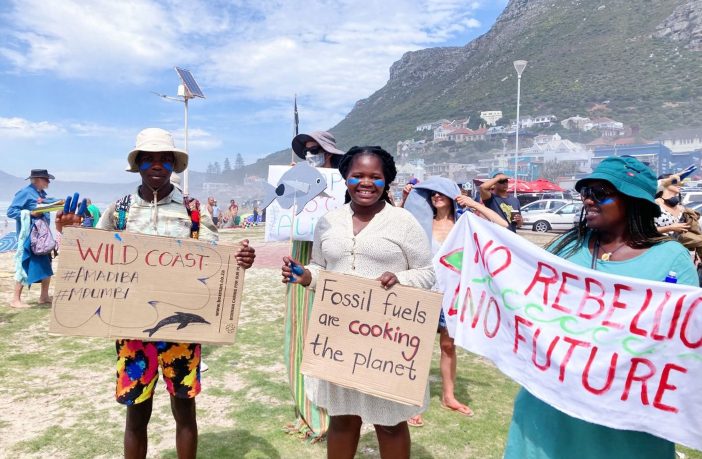- While it was good to hear President Ramaphosa acknowledge the “disastrous” impact of the many extreme weather events affecting the country in recent years and that he recognises that South Africa should be “positioning our economy for future growth in a world shaped by climate change and a revolution in green technologies,” The Green Connection says that these are empty, because government’s words do not match its actions.
Lisa Makaula, Advocacy Officer at The Green Connection says, “We can only truly believe the President about his commitment to addressing climate change, once we see government reject any legislation that could worsen climate change. This includes the current Upstream Petroleum Resources Development Bill (UPRD Bill), which directly contradicts efforts to transition away from fossil fuel extraction. By now, we should already have made steady progress toward a future powered by ecologically sustainable renewable energy, but this proposed legislation seems to ignore the climate crisis and will likely take us even further away from honouring our international climate change commitments.”
“In his speech, the President acknowledged that South Africa has abundant solar and wind resources, and the capacity to create thousands of renewable energy jobs. Why then, are we still be developing policy that seeks to accelerate the exploration and production of climate-change-causing fossil fuels, which financially only benefits a few? Instead of funding fossil fuel projects – which we really cannot afford anymore because of its impact on climate change – we should be spending the bulk of our resources on progressing the just transition. And while President Ramaphosa did mention a Climate Response Fund, what is the point of allocating funds towards compensating people for climate impacts if you continue to push for a fossil fuel economy, which exacerbates climate change? Additionally, South Africans might find it interesting to know that even the International Energy Agency (IEA) highlighted that there is no need for new oil and gas investments in the in our NetZero pathway,” adds Makaula.
According to government, one of the reasons why the SONA matters is “to create transparency with the public and accountability on the part of government”. However, The Green Connection says that this commitment to transparency and accountability is not clear in the UPRD Bill which has been passed by the National Assembly and is now before the NCOP. Neither is this commitment reflected in the way government is processing such legislation, as is the case with the public participation provisions in the Bill. The Green Connection believes that the provisions made for consultation do not meet the requirements for procedurally fair administrative action and have other constitutional implications.
“There are several other reasons to ensure that affected communities are sufficiently engaged in the development of these laws, as a means of protecting themselves from negative outcomes in the future. Consider a study on an oil refinery in Durban, which revealed heightened health risks for communities situated near such facilities, such as increased rates of respiratory diseases and leukaemia. This is a convincing argument for ensuring meaningful public participation. Then there’s the bill’s implications for land use and communal rights, which could exacerbate conflicts between communities and industry, affecting agriculture, traditional livelihoods, and access to natural resources. These are all things that the public has a right to be consulted on. This is also why it is so concerning, when one looks at the Western Cape schedule for public hearings on the UPRD Bill, that several coastal areas (that may be affected by the bill) are not represented,” she says.
The Green Connection’s Legal and Outreach Advisor Priyanka Naidoo says, “While we do seem to be moving in the right direction – with the Climate Change Bill now before the NCOP – it is the fact that we still have legislation on the table that could jeopardise these efforts, that is concerning. Instead of legislating in a manner that would worsen climate change, we need legislation that proactively incorporates long-term greenhouse gas reduction strategies. It is also critical, if we have any hope for effective climate action, that all laws governing development projects promote and encourage sustainable development as well as active and meaningful involvement from all citizens, particularly those in marginalised communities.”
“This is why,” Naidoo says, “The Green Connection strongly opposes the intention to, through the UPRD Bill, expand the functions and powers of the Petroleum Agency (PASA), where it will continue to act as both ‘player and referee’. We do not agree that PASA should have the option of whether or not to conduct public consultations. It should be mandatory, along with the public’s ability to access the necessary information to help them make informed decisions about their future. This also goes for any investments in green energy. Those who will be affected must have a say. However, participation can only be meaningful if the public’s inputs are actually taken into account, which has unfortunately not been the case with this bill. Many of the issues highlighted by The Green Connection, on the UPRD Bill, were ignored.”
The Green Connection submitted its comments on both the Climate Change Bill and the Upstream Petroleum Resources Development Bill (UPRD Bill) on 30 January 2024. The organisation is also in the process of preparing its submission on the Integrated Resources Plan (IRP), due by 23 March 2024.
Source: The Green Connection SA











